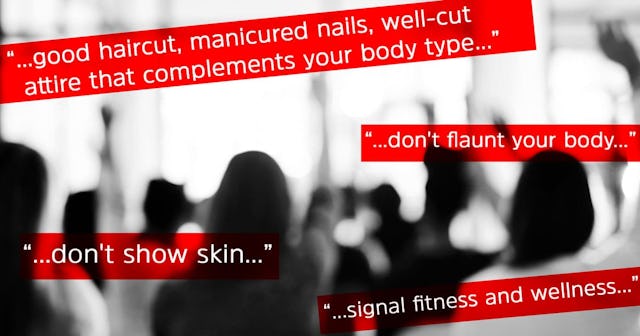Ernst & Young Held A Seminar To 'Fix' The Women They Employ

The Huffington Post obtained some shocking notes from an incredibly sexist Ernst & Young seminar
The “Me Too” movement served as a long-awaited turning point for the ways businesses as a whole respond to women. Men were finally being taken to task for years of abuse and intimidation. Companies began to respond to the uneven playing field women are consistently forced to navigate. Many began holding mandatory harassment trainings and used other tools to make sure employees understood what kind of behavior was “appropriate” in a professional atmosphere. And in the midst of all this, Ernst & Young held a seminar to focus on self-improvement for their female employees.
The training was called Power-Presence-Purpose or PPP. One of the shocked attendees forwarded a 55-page presentation that circulated at the event to a writer at the Huffington Post. Some of the contents the Huffington Post reported read like a manual that’s been frozen in ice for several decades. Women were instructed that the most important thing they could do professionally was “signal fitness and wellness.” A former executive at the firm who spoke to HP on condition of anonymity (using the pseudonym Jane) said an entire section of the presentation was focused on a woman’s appearance. It advised women to be “polished,” and spoke to things like haircuts and manicures. It also advised women to wear “well-cut attire that complements your body type,” and told them not to “flaunt” their bodies because “sexuality scrambles the mind.”
Jane told the Huffington Post that much of the advice made her feel like a “piece of meat,” as the presentation advised women not to “show too much skin” or men wouldn’t be able to focus on the substance of their message.
All of the offensive sections of the presentation provided to HP were terrible, but one sticks out as particularly bad, even amongst this sea of bullshit. Female attendees were given a worksheet that asked them to score themselves based on a list of “masculine” and “feminine” traits. The “masculine” traits were things like “aggressive, ambitious, assertive, dominant, competitive, independent, and willing to take risks,” while the “feminine” traits were listed as “affectionate, childlike, loves children, gullible, shy, soft-spoken, and tender” (among other things). “The message was that women will be penalized, by both men and women, if they don’t adhere to feminine characteristics or if they display more masculine traits,” Jane told the Huffington Post. “And that if you want to be successful, you have to keep this in mind.”
HP reached out to Ernst & Young earlier this month about the training and the company responded that “the course had been under review for months, that the June 2018 event was the last time that version of the training was held at the company and that the course ‘is no longer offered in its current form.”’ But EY also objected to the way the content of the seminar was characterized in Huffpo’s story saying in a statement, “Any isolated aspects are taken wholly out of context.” The company also shared testimonials from current female employees that had been through the training. “Professionally, PPP was the most impactful leadership program that I have had the opportunity to participate in and I have always been incredibly proud and humbled to have been a part of it,” EY senior executive Stacey Moore said in a statement to HP provided by Ernst & Young. “I am forever grateful to the firm for the opportunity and the investment in our women.”
The opinion of a few women who are still employed by the company doesn’t do much to lessen the blow of things like women at the event being instructed on how to interact with their male peers. Things like “Don’t directly confront men in meetings, because men perceive this as threatening. (Women do not.) Meet before (or after) the meeting instead.” There was also this gem: “If you’re having a conversation with a man, cross your legs and sit at an angle to him. Don’t talk to a man face-to-face. Men see that as threatening.” And of course, “Don’t be too aggressive or outspoken.”
It’s exhausting to know that “advice” like this still exists for professional women. And anything besides a complete condemnation of a presentation that would even include any of this drivel simply isn’t enough.